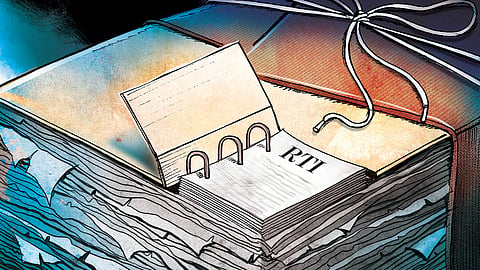

NEW DELHI: Civil society groups and concerned individuals including lawyers, journalists and activists, have launched a campaign against an amendment that weakens the landmark Right to Information (RTI) Act.
This amendment was introduced indirectly through a new data protection law that imposes a blanket ban on revealing personal information.
Activists are demanding the immediate rollback of the amendments made to the RTI through Section 44(3) of the Digital Personal Data Protection (DPDP) Act.
This amendment restricts even journalists from accessing and storing information related to public interest for publication.
Experts believe that this amendment is a death knell for the transparency movement in the country.
Enacted in 2005, the RTI has been instrumental in empowering millions of Indian citizens to seek transparency and accountability from public institutions. However, the amendments introduced through the DPDP Act fundamentally weaken the RTI framework and fail to protect the right to privacy.
“The amendment imposes a blanket exemption on personal data, and curtailing access to such information undermines transparency, weakens the public’s ability to hold authorities accountable, and restricts access to critical government records that impact governance,” said Anjali Bhardwaj, a senior activist associated with people’s organisation the National Campaign for Peoples’ Right to Information (NCPRI) and Satark Nagrik Sangathan (SNS).
“Even a journalist who accesses information related to corrupt practices cannot publish the name of officers in question otherwise, can draw data fiduciaries charges, and government can impose up to Rs 500 crore fines,” said Bhardwaj.
Section 8(1) of the RTI Act states that “information which cannot be denied to the Parliament or a State Legislature shall not be denied to any person.”
Further, 8(1)(J) of the RTI Act provisions allowed disclosure in cases where the information related to public activity or public interest or where there was no unwarranted breach of privacy.
“Actually, these amendments weaponised against those who are critical to the government and demand accountability,” said Nikhil Dey, member of NCPRI.
Apar Gupta of Internet Freedom Foundation, also part of the campaign, said even from the perspective of those working on privacy rights, it is clear that the DPDP Act does nothing to protect our privacy.
“It only serves to concentrate power in the central government and even the regulatory framework is not independent of the executive,” said Gupta.
Prof M M Ansari, former Central Information Commissioner, said the RTI Act has been repeatedly weakened through amendments in 2019 to dilute autonomy of information commissions and now through drastically expanding the scope of the privacy exemption.
The Editor Guild of India raised concern against the amendment to the government last year February.
A group of former bureaucrats also wrote an open letter to the Prime Minster Narendra Modi raising the concern on March 12, 2025.